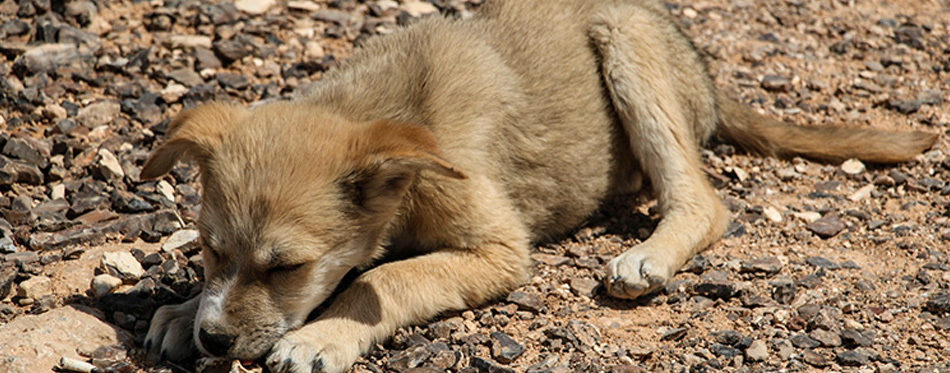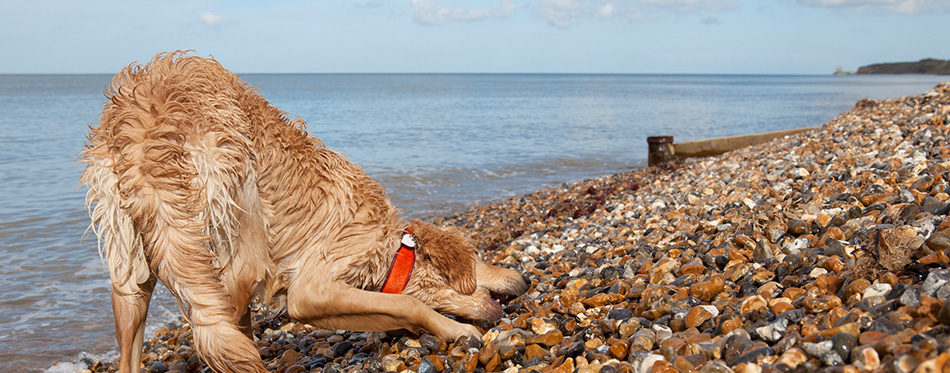As anyone who’s ever had a dog will tell you, our furry friends will often eat things they shouldn’t. Whether it’s pilfering food from the kitchen counter, or chewing grass, you can count on a canine to have some unusual food-related habits.
Another surprisingly common object for dogs to get their teeth around is a rock. So, why do dogs chew rocks, and what can you do about it? Read on to find out.

Why Do Dogs Eat Rocks?
First off, you’re probably wondering “why do dogs chew on rocks anyway?”
There are a few reasons why your dog might have developed this strange behavior:
- Pica
Believe it or not, dogs can develop pica as well as humans. The condition is characterized by a strong desire to consume non-food items. In humans, this often means eating soil, while dogs with pica tend to be drawn to rocks or gravel.
Pica can have different root causes in different animals. Sometimes, it’s a psychological issue, but other times it’s a response to poor nutrition, or another medical condition.
- Nutritional deficiency
As we mentioned above, a dog might try to eat rocks if they have some sort of food deficiency. If a dog is generally malnourished or does not receive enough minerals like iron and sodium, they may be compelled to search for these minerals elsewhere.
For more options, check out our detailed review of Dog Vitamins.
- Other medical disorder
A range of other medical issues besides malnutrition can also cause your pooch to develop rock-eating behavior. Eating or chewing rocks could be a sign of diabetes, worms, or a digestive tract disorder such as irritable bowel syndrome (IBS).
- Psychological reasons
Finally, your pooch could be trying to eat rocks for a psychological reason. Most owners know that dogs who are bored and lonely are far more likely to develop problematic chewing behaviors. Without proper exercise and mental stimulation, they can turn to chewing rocks as well as household items.
In some cases, chewing rocks is also a sign of anxiety, as the animals searches for a way to distract itself from a situation they find distressing. If your dog doesn’t have any chew toys around, turning to rocks is far more likely in times of distress. This may be because of your reaction. Dogs who aren’t receiving the attention they desire may ‘act out’, just like human children. If your dog learns that chewing or eating rocks wins attention from their owner, they’re more likely to do it again in the future.
If you are looking for more options, check out our guide on Dog Chews.
The Danger Of Eating Rocks For Dogs
Whatever the reason, eating rocks is extremely dangerous for dogs.
Rocks can’t be digested like food, and often sit in your dog’s digestive tract causing a blockage or perforation. If your dog is experiencing the following symptoms, they may have swallowed rocks, and should be taken to the vet immediately:
- Vomiting
- Diarrhea
- Loss of appetite
- Bloating
- Refusal to drink
- Lethargy
If your pooch develops these symptoms and you suspect they have swallowed a rock or other non-food item, the sooner you take them to the vet’s the better chance they have of making a speedy recovery.

How To Stop Your Dog From Eating Rocks
If you find your dog or puppy eating rocks, it can be a little distressing. Luckily, there’s plenty you can do as an owner to get to the root of the behavior and stop it.
First of all, you should book an appointment with your vet. They will be able to help you figure out why your canine companion has started eating rocks. To help them, keep a close eye on your pet during the days leading up to your appointment, and make a note of when exactly they try to eat rocks.
Keeping track of your dog’s routine will reveal whether or not the issue is psychological. If it is, your vet will probably recommend some life-style changes, such as:
- Increased exercise
If your dog doesn’t get enough exercise, they’re more likely to let out excess energy through chewing behaviors, which can lead them to ingesting rocks.
- Increased mental stimulation
This is particularly important for intelligent breeds used to work, such as German Shepherds and Labradors. Bored dogs are far more likely to exhibit destructive chewing behaviors, which sometimes includes attempting to chow down on rocks. To keep smart dogs stimulated, you could try games of hide and seek with toys or dog treats, teaching them new tricks, or even taking up a joint activity like agility training or dancing.
- Providing a calmer environment
Some anxious chewers just need a calm space to alleviate the problem. If your household is busy and noisy, your vet may suggest providing a designated calm, quiet spot that your dog can retire to when things become a bit too hectic. This should be warm, comfortable, and out of the way. The calm environment will be even more effective when combined with a regular routine your pooch can get used to.
- Proper socialization
You can also alleviate your dog’s boredom by letting them make friends with other pets. Doggy daycare might be a good solution if they are often home alone, but you could also consider getting a second pet, or simply carving out more time to take them on walks where you’ll bump into other pooches.
- Providing more toys
Like children, dogs can get bored of having the same toys day in and day out. By offering them new and exciting chew toys now and again, they’re much less likely to turn to rocks instead.
On the other hand, if your dog is eating rocks for a physical medical reason, your vet will recommend the appropriate treatment for their condition. If it’s a nutrition issue, they’ll probably suggest a change of diet. If it’s a parasite, they’ll be prescribed drugs to fight the infestation.
Whatever the issue, rest assured it can be managed. Many dogs try to eat rocks at some time or another, but with the right care the problem can be fixed.

